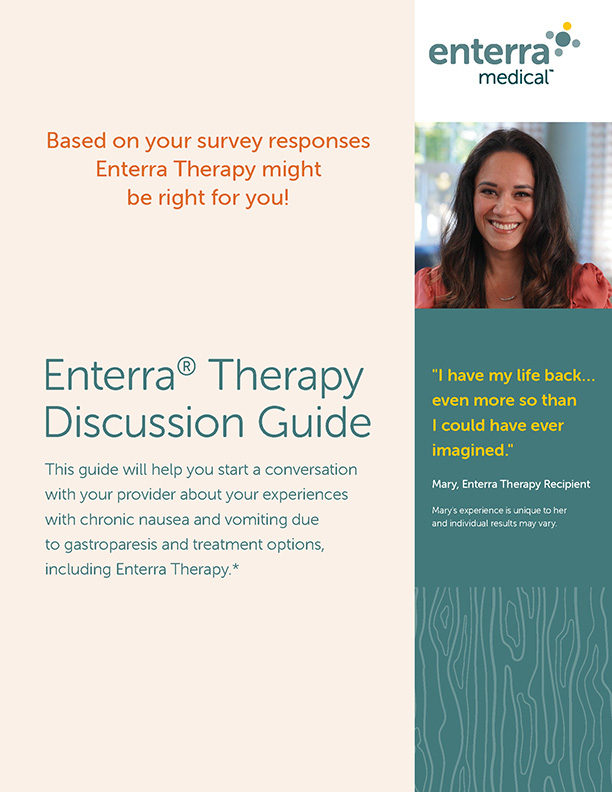Based on your responses Enterra® Therapy might be right for you!
Enterra Therapy* might be right for you because you:
- have gastroparesis due to diabetes or an idopathic (unknown) cause
- are 18-70 years old
- have chronic, intractable (has not responded to medication) nausea and vomiting
Enterra Therapy discussion guide
This discussion guide will help you start a conversation with your provider about your experiences with chronic nausea and vomiting due to gastroparesis and treatment options–including Enterra Therapy– and whether it might be right for you.
Have questions about Enterra Therapy?
Talk with an Enterra Medical Patient Liaison

Our Enterra Medical Patient Liaisons are trained professionals with healthcare experience. They are here to help answer your questions.*
Call now
Monday through Friday
8am to 5pm Eastern Time.
Schedule for later
Schedule a call with an Enterra Medical Patient Liaison.
Connect with a Patient Ambassador

Schedule a ZOOM call with one of the Enterra Therapy Patient Ambassadors for a time that works best for you.

A doctor who offers gastric electrical stimulation can evaluate you to determine if you are a candidate.

Have more questions?

Has gastroparesis taken your seat at the table?
Gastroparesis can take away more than comfort or control over your day, it can take away your appetite for life. See how Enterra® Therapy may help relieve your chronic nausea and vomiting symptoms—and help you take back your seat at the table.
*The information provided is for general and educational purposes only and is not a substitute for professional medical advice, diagnosis or treatment. Always talk to your doctor about the best treatment options for your individual situation.
IMPORTANT SAFETY INFORMATION
Enterra Therapy for treatment of chronic, resistant to medication nausea and vomiting associated with gastroparesis caused by diabetes or an unknown origin in patients aged 18 to 70 years: patients should always discuss potential risks and benefits of the device with their physician.
*HUMANITARIAN DEVICE
Authorized by Federal law for use in the treatment of chronic intractable (drug refractory) nausea and vomiting secondary to gastroparesis of diabetic or idiopathic etiology in patients aged 18 to 70 years. The effectiveness of this device for this use has not been demonstrated. What does this mean?

